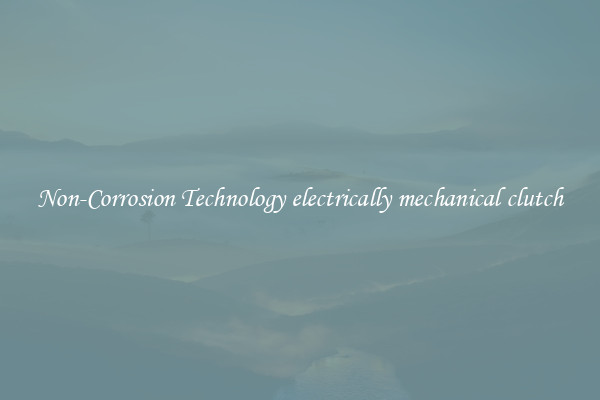Non-Corrosion Technology electrically mechanical clutch
Non-Corrosion Technology: The Future of Electrically Mechanical Clutches

In recent years, there has been a significant surge in the development and implementation of electric vehicles (EVs) around the world. As the demand for cleaner and more sustainable transportation options increases rapidly, researchers and engineers are continually refining the technology associated with electric vehicles. One essential component that requires innovation is the clutch system, and Non-Corrosion Technology is emerging as a groundbreaking solution.
Traditional clutch systems, found in many internal combustion engine vehicles, rely on mechanical linkages and hydraulics. However, these conventional clutches are not always compatible with the electrical systems and the unique demands of electric vehicles. As a result, there is a pressing need for a clutch system that is reliable, efficient, and specifically designed for the evolving EV industry.
Non-Corrosion Technology electrically mechanical clutches offer a revolutionary alternative by combining electrical and mechanical elements. One of the key advantages is the elimination of the hydraulic system, which significantly reduces the risk of corrosion, fluid leaks, and subsequent mechanical failures. This corrosion avoidance is critical to ensure the long-term reliability and safety of EVs.
The Non-Corrosion Technology clutch system operates using an electrical actuation mechanism combined with solid-state technology. It eliminates the need for hydraulic fluid, as the clutch engagement and disengagement process is controlled by electrical signals. This not only enhances the overall efficiency of the clutch system but also simplifies maintenance and reduces environmental hazards associated with the disposal of hydraulic fluids.
Another significant advantage is the increased precision and control provided by Non-Corrosion Technology clutches. The electrical actuation allows for precise modulation, enabling seamless shifting between gears, resulting in improved driving experience and enhanced fuel economy. Additionally, this technology also enhances the regenerative braking capabilities of electric vehicles, contributing to greater energy efficiency.
Furthermore, the Non-Corrosion Technology clutch system offers flexibility in terms of design and integration into various EV platforms. Its compact and lightweight nature makes it suitable for a wide range of vehicle types, including passenger cars, commercial vehicles, and even two-wheelers.
As the demand for electric vehicles continues to grow, the development of reliable and efficient clutch systems becomes crucial. Non-Corrosion Technology electrically mechanical clutches are rapidly gaining attention for their game-changing advantages. By eliminating the drawbacks of traditional hydraulic clutches and introducing innovative electrical actuation methods, this technology paves the way for a new era of enhanced functionality, sustainability, and reliability in EVs.
In conclusion, the emergence of Non-Corrosion Technology electrically mechanical clutches presents a major breakthrough for the electric vehicle industry. By combining electrical actuation with solid-state technology, these clutches offer numerous advantages such as corrosion avoidance, increased precision, and design flexibility, thus shaping the future of clutch systems in electric vehicles. With ongoing research and development efforts, we can expect Non-Corrosion Technology to become the new industry standard, driving the widespread adoption of electric vehicles worldwide.

View details

View details

View details

View details







